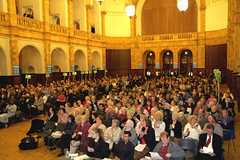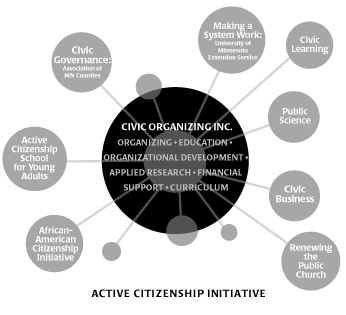Active Purposive Organizing
(One of the things about being involved is that actual participation in issues can keep me from blogging, such as the upcoming National Main Street conference starting this Sunday.)
Today's Guardian, in the Society Guardian section, has an important article "Citizens' gain," about a local community organizing initiative that "believes it has more to offer local communities than the representatives of the main political parties."
From the article:
The Citizens Organising Foundation, which operates in US cities and in London, has just launched an affiliated branch in England's second city. Birmingham Citizens, like its counterpart in the capital, is made up of hundreds of members – from mosques, churches, a trade union, schools and youth groups – who believe that mainstream politics is failing to respond to what people want. By using the general election as a launch pad to get local people's concerns higher on the political agenda, it aims to shake up the city's decision makers and bring power back to the people.
 More than 700 people from Birmingham Citizen's 23 Founding Members gathered at the Great Hall of Birmingham University on the 27th of April for the organisation's first convention. Three issue areas marked Birmingham Citizens initial platform: Safe Streets, a Living Wage, and Rebuilding our Neigbourhoods. From www.birminghamcitizens.org.uk
More than 700 people from Birmingham Citizen's 23 Founding Members gathered at the Great Hall of Birmingham University on the 27th of April for the organisation's first convention. Three issue areas marked Birmingham Citizens initial platform: Safe Streets, a Living Wage, and Rebuilding our Neigbourhoods. From www.birminghamcitizens.org.ukKirk Noden, Birmingham Citizens' lead organiser, believes it will also help to address voter apathy. "The reason people are apathetic is because there isn't a vehicle for them to get their views across," he says. "That's what we're trying to create." ... "Most community organising tends to be very reactive, responding to a shooting in the neighbourhood or a factory closing," he says. "Six months later, that organising disappears. The difference with Citizens is that we believe in permanent organising."
The Birmingham group ... has identified its own priorities, based on interviews with 3,000 people. That boils down to a clearly defined agenda: the clean-up of five parks across the city; the removal of rubbish in three areas; research on affordable housing; regular meetings with police to raise community concerns; and input into the police's cultural awareness training.
For Irsan Rashid, a young medical student and core worker at Young Muslims, the beauty of Birmingham Citizens is that its agenda is set by the people. ... Rashid is an evangelist for the training that the Citizens Organising Foundation provides for its members to ensure that they get what they want. He says: "We don't say, 'We need cleaner streets.' That's too general. We say which streets, we do the financial research, and see if it can be done. Councils can be slippery. We have to pin them down and hold them to account."
________
Doing some Internet research makes me think that the Citizens Organising Foundation approach is based on the Saul Alinksy, Industrial Areas Foundation kind of work, updated for dealing with organizations-bureaucracies staffed with professionals, by being able to speak some of the same language. (Also see this link to "The East London Communities Organization" which has links to other COF affiliates.)
Also, I came across another group in the U.S., that could be related to the group in the UK, the Civic Organizing Foundation. While I couldn't find a direct link, one of their projects is the Minnesota Active Citizenship Initiative, which has a set of foundational principles--the "Civic Organizing Framework" that makes a lot of sense to me, and resonates with my interest in knowledge and competence.

Here is the section on Values...
Values
The values that drive civic organizing must be contested and renewed by every generation.
Belief in Human Capacity
A belief in the people: That every individual has the capacity to know what is good, to grow in that knowledge, to produce, and to be a co-creator of common wealth and justice in the world
Belief in Democracy
A belief in democracy as the best form for human governance. Democracy is rule by the people. It requires a belief that the people have the capacity to discern, to produce and deploy resources, and to create rules—”policies’—that honor the tension between the parts and the whole.
Belief in Active Citizenship
A belief in the role of the citizen as a governing member rather than citizen as a legal status. In a democracy, citizens are obligated to contribute to the well-being of the whole. As a result of their contributions, citizens also share in the benefits the society has to offer. Individuals learn and practice active citizenship in institutions of family, faith, community, work, learning, and governance.
Belief in Political Competence
Politics is the work of the citizen. In order to fulfill the obligation to govern, everyone must develop the political competence needed to take effective action.
Belief in Institutional Efficacy
Institutions in a democracy create, organize, and distribute the complex resources that meet the human need for family, faith, work, community, learning, self-governance, and environmental sustainability. When they do not, citizens are obligated to renew the work of institutions to meet those fundamental needs.



0 Comments:
Post a Comment
<< Home